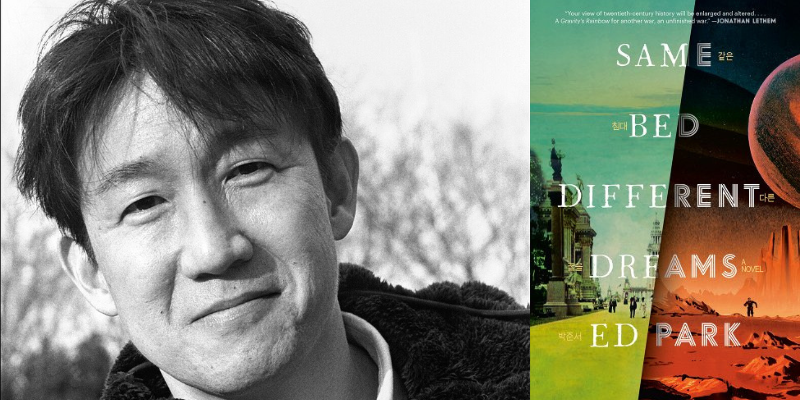Ed Park on Korea’s Past, Real and Imagined
In Conversation with Whitney Terrell and V.V. Ganeshananthan on Fiction/Non/Fiction
Novelist Ed Park joins co-hosts Whitney Terrell and V.V. Ganeshananthan to discuss the role of alternate histories and counternarratives in popular culture, public record, and the general consciousness, via his new novel, Same Bed Different Dreams. Park talks about depicting and reimagining well known events and eras, including the Japanese occupation of Korea between 1910-1945; Korean resistance to that occupation in the form of the Korean Provisional Government; the post-World War II division of Korea into North and South, which became sovereign nations in 1948; and the Korean War, which lasted from 1950 to until 1953. He reflects on writing about more recent history, as well as his hometown of Buffalo, New York. The conversation suggests that positive alternate timelines, like the one Park creates, invite readers to learn more about actual events, whereas a more pernicious spin on the past may edit for the benefit of a particular group. Park reads from the novel.
Check out video excerpts from our interviews at Lit Hub’s Virtual Book Channel, Fiction/Non/Fiction’s YouTube Channel, and our website. This episode of the podcast was produced by Anne Kniggendorf.
*
From the episode:
V.V. Ganeshananthan: Same Bed Different Dreams begins in a speculative future in which a writer ends up reading a manuscript by another, who is an older man known as Echo. That manuscript is an alternative history of Korea, that is kind of an interesting echo, and that manuscript itself appears within your book. And that manuscript is called Same Bed Different Dreams: Being a True Account of the Korean Provisional Government. Since today we’re talking about alternative histories, we’re going to focus first on this part of your book. So of course, that true account is true and also not, and as one of your characters notes, Americans know almost nothing about Korea, despite U.S. involvement with important parts of Korean history.
I thought that for the benefit of our listeners, we would just start with some basic events. So you write about and reference the Japanese occupation of Korea between 1910 and 1945; Korean resistance to that occupation in the form of the Korean Provisional Government; the post-WWII division of Korea into the north, administered by the Soviet Union, and the South, administered by the U.S.; the North and South becoming sovereign nations in 1948; and the Korean War, which lasted from 1950 to 1953. And going past that there are other incidents as well. Why did you decide to start with a period right before the occupation and the rest of the colonial era?
Ed Park: I started writing the novel, and one of the narrators was Korean American and had some of my biographical background. And, I’m essentially a comic novelist—or at least I think of myself as one—but as I wrote, I realized I was getting into something that’s both very important to me, and something that didn’t appear at all in Personal Days. Personal Days was kind of a dark office comedy. There’s a very small reference to ethnicity at, like, two points in the book. Part of that was because I had a very clear idea what that book was going to be, and it was going to be about the office.
I almost streamlined it to focus on the comic aspects. And with Same Bed, which took about nine years to write, just the fact that this was kind of an Ed Park-like narrator, that should have made it easy for me in some ways, but then I realized people don’t really know about the history of modern Korea. People will have heard of the Korean War, but I bet you most Americans don’t know when that was – it’s called “The Forgotten War,” it’s commonly labeled that here – and why should they? I feel like even I, somebody who, you know, my parents came in the late 60s, I was born in Buffalo. It’s hard to get that information. You can say the education system should be better or whatever, but it’s a very complicated history.
I’m interested in lots of periods of Korean history, but I didn’t want to do like a Charlie Kaufman adaptation and start at the beginning of all Korean history, but I thought giving a clear sense of Korea before it became a colony, and leading up to the Korean War, and then of course, it extends beyond by a couple of decades. This is mainly because I realized that it would place the narrator and some of the other characters more firmly in the reader’s mind in a historical sense. What are they? How is it that there are Korean people in America? What’s he doing in Buffalo?
This is something, as a kid, sometimes I would think like, what am I doing? Why am I here? I mean, I love Buffalo in many ways, but especially in the 70s and 80s, you kind of stand out. Every other generation in my family was in Korea, speaking Korean, and here I am speaking English. And I understand some Korean but it’s fading.
I’ll say one more thing, which is that a lot of what I know about Korea isn’t through books or through pop culture, it comes from my parents. My dad would tell me about his early life. He’s old enough that when he first went to school he had to learn Japanese. The school was conducted in Japanese. He’s old enough that he knew the chaos post WWII leading up to the Korean War. And he’s old enough to have been in these very harrowing moments during the Korean War. In a way, it’s helped me understand the characters better and the situation, and also, my parents and myself, I suppose.
Whitney Terrell: So the Korean Provisional Government (KPG) began by resisting Japanese occupation, and a version of it plays a significant role in your book. Can you just talk to us about the actual KPG?
EP: For various reasons, Japan wants Korea, and they annex it in 1905, and it becomes a full-fledged colony in 1910. 1919 is when the last real king of Korea dies, and there’s going to be a mass display of mourning. But what happens instead is the Koreans organize all across the peninsula—remember, it’s not North and South yet, it’s all one country—and they form a peaceful protest, and there’s a declaration of independence. That’s in March of 1919. Just a little bit after that, the Korean Provisional Government forms, and the headquarters is in Shanghai, China. So a lot of these members are in exile. They choose as their president a man named Sigmund Rhee, who is already in the U.S. at this point. He’s mostly living in Hawaii, but he’s kind of been all over. He’s one of the major historical figures in the book. He’s elected in exile, and they don’t really have any power.
It’s a figurehead government, and they just want to publicize what’s happening, and that Korea is its own nation, its own people. I believe I first read about them in this modern Korean history class that I took in grad school. This is like in the early to mid-90s. I got a lot out of that class. But somehow that idea fascinated me, and the word “provisional” fascinated me—that adjective is so full of possibility. As a fiction writer, I just thought it would be fun to play with, and it took me 30 years to follow up.
But my KPG is based in that original reality. What I do in the book is imagine it lasting beyond 1948, and also rounding up people who were not at all part of the KPG. Sigmund Rhee was definitely part of it and some of the other figures, but a lot of them, even the Korean ones, I just shoehorn them in. When I realized the KPG was going to be in this book, it gave me a tremendous amount of freedom and inspiration to talk about these different people who have fascinated me for a while.
Transcribed by Otter.ai. Condensed and edited by Mikayla Vo. Photograph of Ed Park by Sylvia Plachy.
*
Same Bed Different Dreams • Personal Days • Weird Menace
Others:
Charlie Kaufman • Philip Roth • Richard E. Kim • Jack London on Korea • Thomas Pynchon • BTS




















